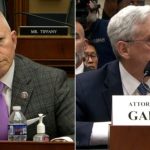Receive free War in Ukraine updates
We’ll send you a myFT Daily Digest email rounding up the latest War in Ukraine news every morning.
Poland will no longer send weapons to Ukraine, Polish prime minister Mateusz Morawiecki has said, in an escalation of tensions between Warsaw and Kyiv that threatens the west’s unity in supporting the country as it battles Russia’s invasion.
The threat is the latest salvo in a trade dispute that revolves around Poland’s refusal to accept imports of Ukrainian grain, in contravention of EU rules, as Morawiecki’s ruling party steps up nationalist rhetoric ahead of next month’s elections.
Asked whether Warsaw would still support Ukraine militarily, Morawiecki replied on Wednesday evening on the Polsat television channel: “We are no longer transferring any weapons, because we will now arm ourselves with the most modern weapons.”
On Thursday some senior government officials in Warsaw sought to downplay the prime minister’s words, insisting Poland remained committed to helping Ukraine win the war and that no decision had been made about long-term weapons deliveries.
“At the moment it is as the prime minister said, in the future we will see,” Jacek Sasin, minister for state assets, told Polish Radio Plus.
The threat comes after Poland, alongside Hungary and Slovakia, last weekend unilaterally extended an import ban on Ukrainian grain, even after Kyiv promised to ensure its exports would not harm EU farmers. That provoked a backlash from Ukrainian officials, led by President Volodymyr Zelenskyy.
Morawiecki’s comments may signal a remarkable U-turn from a government that had previously been a linchpin of the EU and Nato’s united front in support of Ukraine, as one of Europe’s closest allies of both Washington and Kyiv.
Warsaw has consistently urged the west to provide more weapons and financial support to Ukraine and to increase sanctions and political pressure on Russia.
The threat to block future arms shipments could also derail efforts by the EU to agree a €20bn Ukraine weapons fund for the next four years, which requires unanimity among the bloc’s 27 members and is already being opposed by Hungary.
Western officials sought to play down the remarks as an emotional response to the tensions over the grain dispute and the domestic Polish political context, and would not herald the end of Warsaw’s support for Kyiv’s war effort.
“I just don’t see any evidence of that throughout the bureaucracy in Poland. There is a firm commitment to stay the course,” said a senior US official in response to Morawiecki’s remarks. “I don’t think we will see a dramatic shift in alliance unity.”
One EU official said: “It changes nothing at this stage . . . as always with Poland there is usually a huge gap between their public statements and real actions. The real problem might come if they decide to block the [EU weapons fund] which they haven’t so far and I doubt they would.”
Poland is preparing for a fiercely contested October 15 election, in which Morawiecki’s ruling Law and Justice (PiS) party needs the backing of its rural electorate to win a third term in office.
Another participant in the grain blockade, Slovakia, is holding an election on September 30 whose frontrunner, Robert Fico, wants to stop aid to Ukraine.
Read the full article here



